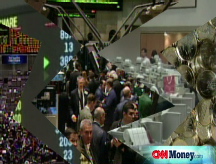Get ready for the final rate cut - will it matter?
The Fed is expected to lower its key interest rate to 0.5%. Experts think it will signal that the central bank will have to get more creative to get the economy out of recession.


NEW YORK (CNNMoney.com) -- Will the 10th time be the charm for Ben Bernanke and the Federal Reserve?
The Fed is expected to cut interest rates at the conclusion of a two-day meeting on Tuesday. And if the central bank does lower its key federal funds rate, that would be the 10th cut since September 2007.
Most economists believe the Fed will reduce the target on the fed funds rate by a half-percentage point to 0.5%. But there are some who think the Fed may go even further and drop the target to 0.25%.
Fed rate cuts typically help the economy because they lead banks to drop their prime rates, which influence the rates set for credit cards, home equity lines of credit and other personal loans as well as business loans.
But so far, there has been no evidence that the rate cuts have done anything to stimulate the economy. We now know for certain that the economy is in recession and it began in December 2007. Some believe the recession could last well into 2009...or even longer.
So with that in mind, does this week's widely-anticipated rate cut even matter? Yes and no.
On the one hand, another rate cut will be Fed chairman Bernanke's way of showing investors and consumers that he is holding nothing back as he and the rest of the Fed try to get the economy out of its funk.
"I think the Fed is going to cut rates and it's going to be intended as a signal that the Fed will do whatever is necessary to keep the economy from sliding too deeply in this recession," said David Resler, chief economist with Nomura Securities International Inc.
But if the Fed cuts rates to 0.5% or even lower, it will not have much more room to cut after that. And unless Bernanke has been watching too much TV and has The Fixx song "Saved By Zero" featured in those annoying Toyota commercials stuck in his brain, it's not likely that he will cut rates any further in the future.
"Once you get rates down to zero, it's hard to move off of zero. Japan learned that the hard way," said Kurt Karl, chief U.S. economist with Swiss Re, in reference to Japan's policy of keeping rates that low for almost six years earlier this decade."Plus, you've made the price of money free and it shouldn't be. There should be some cost to loans."
Still, this doesn't mean that the Fed's work is done. Instead, Bernanke & Co. are likely to stress that they will continue acting more creatively to deal with the credit crunch.
"The Fed may hint that this next rate cut is sufficient," said Karl. "But the other thing the Fed will emphasize is that it has more tools, more arrows in the quiver. The Fed's job is not over just because there may be no more interest rate cuts."
Along those lines, the Fed has already taken several steps beyond its usual practice of simply managing interest rates. For example, the central bank has set up facilities to lend more money to businesses through the commercial paper market.
Most recently, it announced an initiative to buy mortgage-backed securities from Fannie Mae and Freddie Mac, the mortgage financing giants now essentially controlled by the government. And that, so far at least, has helped drive down mortgage rates.
"The key for the Fed is no longer interest rates but all the other unconventional measures it is using. There are other ways of providing stimulus to the economy," Resler said.
However, the Fed may not really be able to provide much in the way of an actual boost to the economy any time soon. One economist suggested that, at best, the Fed can only make sure the economy doesn't get much worse.
"The important issue is not whether or not the Fed is creating additional demand because at this point, that's not happening. It is essentially providing liquidity that's needed for financial markets to function," said Oscar Gonzalez, an economist with John Hancock Financial Services.
But Gonzalez added that if the Fed keeps interest rates relatively low for awhile, that could eventually help get the economy back on track since it might make it cheaper for the government to pay for a new stimulus package, one that is expected to focus on infrastructure spending and long-term job creation.
"The Fed is inviting fiscal stimulus with low interest rates. It's an inexpensive way for Treasury to issue new debt," he said.
Gonzalez conceded though that the likely benefits from any stimulus package might not be felt until 2010.
Ironically enough, the government may decide to go deeper into debt in order to stimulate the economy. But Resler is hopeful that corporations and consumers will actually cut their debt load over the next few months since he said that is really what is needed to fix what's ailing the economy.
"Quite clearly this is a painful time," he said. "But the issue is less an impairment of credit but [rather] the widespread recognition that we must, as a nation, reduce our level of debt. We simply can't rely on debt to support the levels of activity we've had." ![]()



